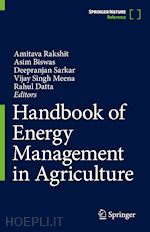
Questo prodotto usufruisce delle SPEDIZIONI GRATIS
selezionando l'opzione Corriere Veloce in fase di ordine.
Pagabile anche con Carta della cultura giovani e del merito, 18App Bonus Cultura e Carta del Docente
Carbon footprints in Rice cultivation.-Carbon footprints of farm machinery in India.-Energy requirement for sustainable sugarcane cultivation in India.-Carbon Footprint of Different Energy Intensive System.-Determination of fuel properties of cropbiomass through physical and chemical analysis.-Management and Utilization of Agricultural Residue by Using Forced Draft Gasifier Cookstove.-Biomass Energy from Agriculture:Conversion Techniques and Use.-Biomass-a sustainable energy solution from agriculture.-Biomass Technologies for Crop Residue Management
Amitava Rakshit, an IIT-Kharagpur alumnus, is presently Senior Associate Professor at the Department of Soil Science and Agricultural Chemistry at Institute of Agricultural Sciences, Banaras Hindu University. Dr. Rakshit worked in the Department of Agriculture, Government of West Bengal in administration and extension roles. He has visited Scandinavia, Europe, Africa, UAE, and Bangladesh pertaining to his research work and presentation. He was awarded with TWAS Nxt Fellow (Italy), Biovision Nxt Fellow (France), Darwin Now Bursary (British Council, UK), Young achiever award, Shastri Indo-Canadian Institute award, and Best Teacher’s Award at UG and PG level by BHUICAR, state level by Uttar Pradesh Academy of Agricultural Sciences, and national level by All India Agricultural Students Association in 2009, 2012, 2018, and 2019, respectively. He is serving as review college member of British Ecological Society, London since 2011, member of Global Forum on Food Security and Nutrition of FAO, Rome, and Commission on Ecosystem Management of IUCN. He has published 105 research papers, 49 book chapters, 28 popular articles, and 3 manuals, and authored 29 books for Springer, Elsevier, and CRC Press.
Asim Biswas is a Professor at the School of Environmental Science, University of Guelph, Canada. He is also an Adjunct Professor in the Department of Natural Resources Sciences, McGill University Canada, and a Visiting Professor at Jiangxi University of Finance and Economics and Jiangsu University, China. His research program on sustainable soil management is focused on xv increasing the productivity and resilience of our landbased agri-food production systems in an environmentally sustainable way while accounting for changing climate, economy, and production methodologies. Currently, he runs a 21-member research team, funded by federal and provincial bodies as well as industries, grower’s associations, and international organizations. He has authored and coauthored 113 peer-reviewed journal papers, including 21 in review, 165 conference abstracts, 12 proceedings, 15 book chapters, 2 popular articles, edited a book, delivered radio and TV interviews, and was granted a patent. He was invited to deliver keynote talks around the world and currently teaches multiple undergraduate, graduate, and special courses. Currently, he is an Associate Editor for four journals and a Guest Editor for another four journals.
Vijay Singh Meena is working as a Project Coordinator atInternational Maize and Wheat Improvement Center (CIMMYT)-Borlaug Institute for South Asia (BISA). He worked as a Scientist at ICAR-Vivekananda Parvatiya Krishi Anusandhan Sansthan, Almora, India. His research areas include various aspects of soil aggregation, carbon management index, and carbon and nitrogen sequestration potential under different land types and cropping systems of the north-western Indian Himalayas. He identified the carbon management index as the key indicator to measure soil degradation in different agroecosystems. His research revealed that the application of farmyard manure (FYM) and vermicompost along with vegetative barriers across the slope is highly effective in sustaining the soil quality. He reported that potassium solubilizing rhizobacteria (KSR) enhances 25–40% potassium (K) availability and helps plants to uptake K from the soils. Dr. Meena identified that the combined application of organic and inorganic sources is important in sustaining the productivity of











Il sito utilizza cookie ed altri strumenti di tracciamento che raccolgono informazioni dal dispositivo dell’utente. Oltre ai cookie tecnici ed analitici aggregati, strettamente necessari per il funzionamento di questo sito web, previo consenso dell’utente possono essere installati cookie di profilazione e marketing e cookie dei social media. Cliccando su “Accetto tutti i cookie” saranno attivate tutte le categorie di cookie. Per accettare solo deterninate categorie di cookie, cliccare invece su “Impostazioni cookie”. Chiudendo il banner o continuando a navigare saranno installati solo cookie tecnici. Per maggiori dettagli, consultare la Cookie Policy.